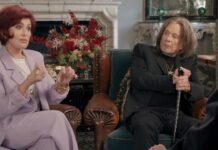Guns N’ Roses guitarist Slash was recently interviewed by Poland’s Wirtualna Polska. Blabbermouth transcribed his comments. Slash appeared to back up Metallica drummer Lars Ulrich, who has long railed against internet file sharing for killing the music business.
On whether he ever tires of being one of the most world’s most recognized musicians:
Slash: “I don’t play the big rock star guy very well. I’m not that guy. I just say, ‘Fuck it — I just want to play,’ and that’s all I really focus on. I pretty much am playing all the time… It’s very much a passion thing for me, and all the other sort of bullshit that comes with having arrived at any form of success is [irrelevant]. I just don’t do the celebrity thing. People might want to try and see me in that kind of a role, but it just doesn’t stick.”
On streaming platforms and the modern music industry:
Slash: “Back in the late ’90s/early millennium, when everybody was doing the file-sharing thing, the Internet basically killed the music industry. Now, we’ve sort of come out of it with the streaming services, but they don’t pay anywhere near the royalties that buying a CD or a record pays. It’s definitely hurt the music business in a big way. It’s easier for customers, but it’s definitely not doing any favors to the actual artists.”
On how he chooses the members of his various bands:
Slash: “I jam a lot. I do a lot of sessions, and you meet people and you remember people that you played with that you felt really comfortable playing with, or that you thought were really good. I’ve been doing this a long time, so I know a lot of musicians, but for me personally, you’re usually looking for people that really have a natural gift for the sort of rock ‘n’ roll feel. One of the great things about The Conspirators was [that] I didn’t know any of them. I did not see it coming. I worked with Myles on my first solo record. I’d never heard him sing before. I’d heard a lot about him, and I called him up and asked him if he wanted to sing a song on this solo record with all these different singers. He was amazing, so we ended up doing two songs together on that record. Then I was, like, ‘I have to do a tour to support this record, and I can’t bring all these different singers on the road with me. Would you like to do it?’ I knew that he had the kind of range that he could do all that different material, and then also Velvet Revolver songs, Guns N’ Roses songs, [Slash’s] Snakepit songs, all that. When he agreed to do it, then I had to go look for musicians for the actual band. I was introduced to Brent Fitz, who I’d never heard of. He was amazing. At the time, I actually did have a bass player that I was working with. He was a really good musician, but he wasn’t the right feel for what it was that I was trying to do. Brent goes, ‘I know this guy named Todd [Kerns] that lives in Vegas. He’s really good’… I couldn’t have asked for a better bass player. It just clicked. That was a chance thing where the stars aligned and put me in contact with the right musicians without me having known anything about them.”
On his early days as a guitarist:
Slash: “I had a lot of crises with other people who were trying to get me to do something that I didn’t want to do, or weren’t agreeing with my dedication to the guitar because it was taking time away from other things. I had a lot of that. I had a lot of people telling me to give it up — that there were too many guitar players. But I never got bored with it myself. That’s probably how I got through it all.”
On his work ethic:
Slash: “Everybody calls me a workaholic. I think it’s just that I really love what it is that I do, and in order to be able to do it, you have to be at it all the time. You can’t just sort of hang around. I mean, some people do that, but I’m not like that. I’m like, ‘I want to make a new record. I want to go on the road. I want to go make another record. I want to go back on the road.’ Maybe it’s a workaholic thing, but I love jamming. I love playing.”
On people who wear shirts of bands whose music they don’t know:
Slash: “The funny one to me is all the kids that wear CBGB shirts, that have no idea what CBGB is. In a way, it’s sort of carrying the torch. It might be fashionable to some [and] some sort of statement, but in a way, it keeps that brand alive, so it’s cool. You can’t get angry with people because they’re wearing a t-shirt that looks cool and have no idea what the band is that’s on it.”













